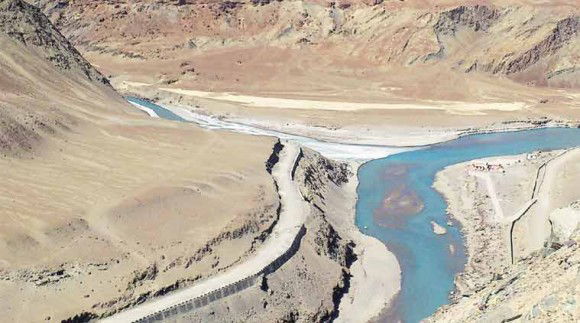Headlines
Pakistan not to accept alteration in Indus Waters Treaty

Islamabad, Dec 17 : Fearing that India is buying time to complete two disputed water projects, Pakistan made it clear that it would not accept any modifications or changes to the Indus Waters Treaty after New Delhi said on Friday it was ready to bilaterally resolve its differences with Islamabad over the pact's implementation.
The treaty, signed in 1960, gives India control over the three eastern rivers of the Indus basin - the Beas, the Ravi and the Sutlej - while Pakistan has the three western rivers- the Indus, the Chenab and the Jhelum.
The IWT also sets up a mechanism, the Permanent Indus Commission, which includes a commissioner from each country.
Talking to Dawn here on Friday, Special Assistant to Prime Minister Tariq Fatemi said: "Pakistan will not accept any modifications or changes to the provisions of the Indus Waters Treaty. Our position is based on the principles enshrined in the treaty. And the treaty must be honoured in...letter and spirit".
Earlier, a spokesman for the Indian Ministry of Foreign Affairs, Vikas Swarup, told reporters in New Delhi that the resolution process required more time.
"India has always believed that the implementation of the Indus Waters Treaty, which includes the redressal of the technical questions and differences, should be done bilaterally between India and Pakistan," he said. "We believe that these consultations should be given adequate time."
India's request for more time, however, alarmed Pakistan. Islamabad argued that India used the same strategy on previous occasions, completing a project during the dispute and then insisting that since the project was already complete, it could not be modified.
The current dispute revolves around the Kishanganga (330 megawatts) and Ratle (850 megawatts) hydroelectric plants. India is building the plants on the Kishanganga and Chenab Rivers, which Pakistan says violate the IWT.
Tensions over the water dispute increased late last month when Indian Prime Minister Narendra Modi threatened to block the flow of water into Pakistan. International experts fear that the threat, if implemented, could lead to armed clashes between the two sides.
New Delhi sought the appointment of a "neutral expert" while Islamabad asked the World Bank to appoint the chairman of the Court of Arbitration. The IWT recognises the World Bank as an arbitrator.
Pakistanis argue that the designs of the two Indian projects violate both legal and technical provisions of the treaty. India, however, opposes Pakistan's effort for setting up a court of arbitration.
The disagreement persuaded the World Bank to announce earlier this week that it was temporarily "pausing" its arbitration and it was doing so to protect the treaty.

1 hour ago
Democrat Mikie Sherrill wins New Jersey governor's race

1 hour ago
Vivek Ramaswamy responds to Democratic sweep, urges end to "identity politics"

1 hour ago
"Free Palestine" slogans echo at NYC Mayor-Elect Zohran Mamdani's victory rally, some Jewish organisations lend support

1 hour ago
"A moment comes, which comes but rarely in history," Zohran Mamdani invokes Nehru's tryst with destiny speech after NYC mayoral win

1 hour ago
After election losses, Trump blames shutdown but denies personal responsibility

3 hours ago
Robin J. Elackatt Re-Elected as Missouri City Mayor for Third Term

5 hours ago
India and US bat for enhanced interoperability, mutual security during Hawaii meeting

5 hours ago
Hyderabad-born Ghazala Hashmi scripts history by winning Virginia Lt Governor's race

5 hours ago
Election setback for Trump poses dilemmas for him, Democrats

8 hours ago
Ram Gopal Varma says, 'my true birth as a filmmaker was given by Nagarjuna'

8 hours ago
Anupam Kher pens heartfelt wishes on Guru Nanak Jayanti

8 hours ago
Rashmika Mandanna on ‘The Girlfriend’: Know it’s going to be spoken about for many more years to come

8 hours ago
Shweta Tripathi on ‘Mirzapur: The Movie’: Reliving Golu’s bookworm phase is exciting yet challenging






















